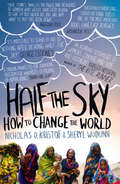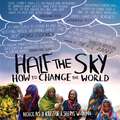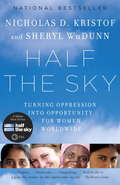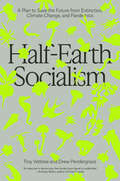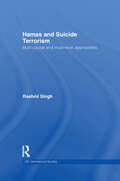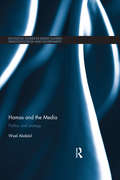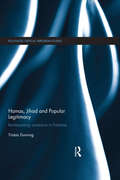- Table View
- List View
Half The Sky: How to Change the World
by Nicholas D. Kristof Sheryl WuDunnPulitzer Prize-winning reporting team, husband and wife Nicholas D. Kristof and Sheryl WuDunn, take us on a journey through Africa and Asia to meet an extraordinary array of exceptional women struggling against terrible circumstances. More girls have been killed in the last fifty years, precisely because they are girls, than men were killed in all the wars of the twentieth century combined. More girls are killed in this routine 'gendercide' in any one decade than people were slaughtered in all the genocides of the twentieth century. In the nineteenth century, the central moral challenge was slavery. In the twentieth, it was totalitarianism. In the twenty-first, Kristof and WuDunn demonstrate, it will be the struggle for gender equality in the developing world. Fierce, moral, pragmatic, full of amazing stories of courage and inspiration, HALF THE SKY is essential reading for every global citizen.
Half The Sky: How to Change the World
by Nicholas D. Kristof Sheryl WuDunnPulitzer Prize-winning reporting team, husband and wife Nicholas D. Kristof and Sheryl WuDunn, take us on a journey through Africa and Asia to meet an extraordinary array of exceptional women struggling against terrible circumstances. More girls have been killed in the last fifty years, precisely because they are girls, than men were killed in all the wars of the twentieth century combined. More girls are killed in this routine 'gendercide' in any one decade than people were slaughtered in all the genocides of the twentieth century. In the nineteenth century, the central moral challenge was slavery. In the twentieth, it was totalitarianism. In the twenty-first, Kristof and WuDunn demonstrate, it will be the struggle for gender equality in the developing world. Fierce, moral, pragmatic, full of amazing stories of courage and inspiration, HALF THE SKY is essential reading for every global citizen.
Half the Sky: Turning Oppression into Opportunity for Women Worldwide
by Nicholas D. Kristof Sheryl WuDunn#1 NATIONAL BESTSELLER • A passionate call to arms against our era&’s most pervasive human rights violation—the oppression of women and girls in the developing world. From the bestselling authors of Tightrope, two of our most fiercely moral voicesWith Pulitzer Prize winners Nicholas D. Kristof and Sheryl WuDunn as our guides, we undertake an odyssey through Africa and Asia to meet the extraordinary women struggling there, among them a Cambodian teenager sold into sex slavery and an Ethiopian woman who suffered devastating injuries in childbirth. Drawing on the breadth of their combined reporting experience, Kristof and WuDunn depict our world with anger, sadness, clarity, and, ultimately, hope.They show how a little help can transform the lives of women and girls abroad. That Cambodian girl eventually escaped from her brothel and, with assistance from an aid group, built a thriving retail business that supports her family. The Ethiopian woman had her injuries repaired and in time became a surgeon. A Zimbabwean mother of five, counseled to return to school, earned her doctorate and became an expert on AIDS.Through these stories, Kristof and WuDunn help us see that the key to economic progress lies in unleashing women&’s potential. They make clear how so many people have helped to do just that, and how we can each do our part. Throughout much of the world, the greatest unexploited economic resource is the female half of the population. Countries such as China have prospered precisely because they emancipated women and brought them into the formal economy. Unleashing that process globally is not only the right thing to do; it&’s also the best strategy for fighting poverty.Deeply felt, pragmatic, and inspirational, Half the Sky is essential reading for every global citizen.
Half-Earth Socialism: A Plan to Save the Future from Extinction, Climate Change and Pandemics
by Troy Vettese Drew PendergrassA plan to save the earth and bring the good life to all In this thrilling and capacious book, Troy Vettese and Drew Pendergrass challenge the inertia of capitalism and the left alike and propose a radical plan to address climate disaster and guarantee the good life for all. Consumption in the Global North can&’t continue unabated, and we must give up the idea that humans can fully control the Earth through technological &“fixes&” which only wreak further havoc. Rather than allow the forces of the free market to destroy the planet, we must strive for a post-capitalist society able to guarantee the good life the entire planet. This plan, which they call Half-Earth Socialism, means we must: • rewild half the Earth to absorb carbon emissions and restore biodiversity • pursue a rapid transition to renewable energy, paired with drastic cuts in consumption by the world&’s wealthiest populations • enact global veganism to cut down on energy and land use • inaugurate worldwide socialist planning to efficiently and equitably manage production • welcome the participation of everyone—even you! Accompanied by a climate-modelling website inviting readers to design their own &“half earth,&” Vettese and Pendergrass offer us a visionary way forward—and our only hope for a future.
Half-Life of a Zealot
by Swanee HuntSwanee Hunt's life has lived up to her Texas-size childhood. Daughter of legendary oil magnate H. L. Hunt, she grew up in a household dominated by an arch-conservative patriarch who spawned a brood of colorful offspring. Her family was nothing if not zealous, and that zeal--albeit for more compassionate causes--propelled her into a mission that reaches around the world. Half-Life of a Zealot tells how the girl who spoke against "Reds" alongside her father became a fierce advocate for progressive change in America and abroad, an innovative philanthropist, and Bill Clinton's Ambassador to Austria. In captivating prose, Hunt describes the warmth and wear of Southern Baptist culture, which instilled in her a calling to help those who are vulnerable. The reader is drawn into her full-throttle professional life as it competes with critical family needs. Hunt gives a remarkably frank account of her triumphs and shortcomings; her sorrows, including a miscarriage and the failure of a marriage; the joys and struggles of her second marriage; and her angst over the life-threatening illness of one of her three children. She is candid about the opportunities her fortune has created, as well as the challenge of life as an heiress. Much of Swanee Hunt's professional life is devoted to expanding women's roles in making and shaping public policy. She is the founding director of Harvard's Women and Public Policy Program at the Kennedy School of Government, chair of the Initiative for Inclusive Security, and president of the Hunt Alternatives Fund. Swanee Hunt's autobiography brims over with strong women: her mother, whose religious faith and optimism were an inspiration; her daughter, who fights the social stigma of mental disorders; the women of war-torn Bosnia, who transformed their grief into action; and friends like Hillary Clinton, who used her position as First Lady to strengthen the voices of others. Hunt is one more strong woman. Half-Life of a Zealot is her story--so far.
Hamari Sansad
by Subhash KashyapBest book available in the Market to understand Indian Constitution. Kashyap has been the pioneer writer on Indian Constitution and topmost commentator on different aspects of constitutions. For a student in university or for an aspirant preparing for civil services exam. This is the most important book.
Hamas Contained: The Rise and Pacification of Palestinian Resistance (Stanford Studies in Middle Eastern and Islamic Societies and Cultures)
by Tareq BaconiHamas has ruled Gaza and the lives of the two million Palestinians who live there since 2006. Hamas Contained, first published in 2018, offers a history of the group, drawing on interviews with organization leaders and their publications. Tareq Baconi maps Hamas's thirty-year transition from fringe military resistance towards governance, culminating in Israeli efforts to contain the movement to the Gaza Strip. Baconi argues that under Israel's approach of managing rather than resolving the conflict, Hamas's demand for Palestinian sovereignty has effectively been marginalized in favor of military action against Hamas, and by implication, all Palestinians in the Gaza Strip. This dynamic—a violent equilibrium between Hamas and Israel and the movement's containment in the Gaza Strip—lasted for sixteen years, until it was decidedly shattered by Hamas's offensive on October 7, 2023. Now with new material that provides an analytical framework and reflection on Hamas's offensive of October 7, 2023, and Israel's ensuing war on Gaza, Hamas Contained is an even more essential guide to understanding Hamas and the brutal violence of Israel's war on Palestinians.
Hamas Rule in Gaza: Human Rights under Constraint
by Tariq MukhimerDeveloping a normative framework for evaluating non-state actors in the absence of formally binding obligations, this study is the first detailed human rights analysis of Hamas conduct and governance in the Gaza Strip.
Hamas and Civil Society in Gaza: Engaging the Islamist Social Sector (Princeton Studies in Muslim Politics #50)
by Sara RoyA revealing look at Islamic social institutions in Gaza and the West BankMany in the United States and Israel believe that Hamas is nothing but a terrorist organization, and that its social sector serves merely to recruit new supporters for its violent agenda. Based on Sara Roy's extensive fieldwork in the Gaza Strip and West Bank during the critical period of the Oslo peace process, Hamas and Civil Society in Gaza shows how the social service activities sponsored by the Islamist group emphasized not political violence but rather community development and civic restoration.Roy demonstrates how Islamic social institutions in Gaza and the West Bank advocated a moderate approach to change that valued order and stability, not disorder and instability; were less dogmatically Islamic than is often assumed; and served people who had a range of political outlooks and no history of acting collectively in support of radical Islam. These institutions attempted to create civic communities, not religious congregations. They reflected a deep commitment to stimulate a social, cultural, and moral renewal of the Muslim community, one couched not only—or even primarily—in religious terms.Vividly illustrating Hamas's unrecognized potential for moderation, accommodation, and change, Hamas and Civil Society in Gaza also traces critical developments in Hamas's social and political sectors through the Second Intifada to today, and offers an assessment of the current, more adverse situation in the occupied territories. The Oslo period held great promise that has since been squandered. This book argues for more enlightened policies by the United States and Israel, ones that reflect Hamas's proven record of nonviolent community building.
Hamas and Palestine: The Contested Road to Statehood (Routledge Studies in Middle Eastern Democratization and Government)
by Martin KearHamas and Palestine: The Contested Road to Statehood analyses the Palestinian Islamist movement, Hamas, between 2005 and 2017. The book expounds how Hamas has employed a dual resistance strategy, consisting of political and armed resistance, as a mechanism to achieve, maintain, and defend its continued political viability. Hamas entered politics to transform the role of the Palestinian Authority from an administrative institution into one driving the Palestinian quest for independence. To achieve this the analysis explains how Hamas implemented a process of soft-Islamisation in Gaza. This was intended to build the institutional capacity of the Authority based on the bureaucratisation and professionalisation of key institutions, while selectively increasing the role of Islam in society. The book provides a detailed explanation of key shifts in Hamas’s political behaviour as it adapts to the vagaries and vicissitudes of governing Gaza, despite the imposition of Israel’s political and economic siege. Employing the Inclusion-Moderation theoretical framework, the book traces Hamas’s transformation from a non-state armed group into a legitimate actor in Palestinian politics. The book’s analysis also highlights the key role that Hamas’s national liberation agenda has on shifting its behaviour towards adopting more moderate and inclusive policy stances. Specifically, the analysis demonstrates how Hamas has made measurable shifts in it political behaviour towards accepting the primacy of the two-state solution, and its dealings with Israel and the Peace Process. The book provides a comprehensive assessment of Hamas’s time in government and its capacity to deal with the vicissitudes of governing. It is a valuable resource for students and researchers interested in the Israeli-Palestinian conflict and Middle East Politics.
Hamas and Suicide Terrorism: Multi-causal and Multi-level Approaches (LSE International Studies Series)
by Rashmi SinghThis book analyses the root causes of suicide terrorism at both the elite and rank-and- file levels of the Hamas and also explains why this tactic has disappeared in the post-2006 period. This volume adopts a multi-causal, multi-level approach to analyse the use of suicide bombings by Hamas and its individual operatives in the Israeli-Palestinian conflict. It uses extensive fieldwork and on-the-ground interviews in order to delve beneath the surface and understand why and how suicide operations were adopted as a sustained mechanism of engagement within the Israeli-Palestinian conflict. Three core factors fuelled Hamas’s suicide bombing campaigns. First, Palestinian suicide operations are a complex combination of instrumental and expressive violence adopted by both organisations and individuals to achieve political and/or societal survival, retaliation and competition. In other words, suicide bombings not only serve distinct political and strategic goals for both Hamas and its operatives but they also serve to convey a symbolic message to various audiences, within Israel, the Palestinian territories and around the world. Second, suicide operations perform a crucial role in the formation and consolidation of Palestinian national identity and are also the latest manifestation of the historically entrenched cultural norm of militant heroic martyrdom. Finally, Hamas’s use of political Islam also facilitates the articulation, justification and legitimisation of suicide operations as a modern-day jihad against Israel through the means of modern interpretations and fatwas. This approach not only facilitates a much needed, multifaceted, holistic understanding of suicide bombings in this particular region but also yields policy-relevant lessons to address extreme political violence in other parts of the world. This book will be of much interest to students of Hamas, terrorism, Middle East politics and security studies.
Hamas and the Media: Politics and strategy (Routledge Studies in Middle Eastern Democratization and Government)
by Wael AbdelalThe Islamic resistance movement ‘Hamas’ is, arguably, one of the most important Palestinian organizations in recent decades. Since Hamas' establishment, it has extensively utilized media as a means of mobilization for its political and ideological agendas, and its tactics have undergone a remarkable evolution, from graffiti art to satellite broadcasting. This book presents the first systematic and historical contextualization of the development of Hamas' media strategy. It determines three key phases in Hamas’ development and explores the complex and important relationship at work between its politics and use of media. Assessing four elements of the Hamas media strategy; the media message (discourse), the media objectives, the infrastructure, and the target audience, this book tracks how Hamas grew its media infrastructure, and looks at how the idea of resistance has permeated the media discourse. Determining both tactical and strategic objectives and detailing the various layers to the target audience, it offers the first in-depth academic study of the Hamas media strategy. This book’s exploration of the key role the media plays in the Palestinian issue makes it a timely and relevant contribution to the study of the Israeli-Palestinian Conflict and a valuable resource for students, scholars and policymakers working in Middle Eastern studies.
Hamas in Politics: Democracy, Religion, Violence
by Jeroen GunningMany of Hamas's apparent contradictions flow from the relationship between the organization's ideology, local constituency, and the nature of politics in Israel and Palestine. Gunning conducts interviews with members of Hamas as well as the group's critics and draws on a decade of close observation of the organization. He illuminates Hamas's understanding of its ideology and explores the tension between its dual commitment to "God" and "the people." Examining the group's political practice and what it says about the group's attitude towards democracy, religion, and violence, Gunning provides a unique window into Hamas's internal structure, revealing its process of choosing leaders and determining policy.
Hamas vs. Fatah: The Struggle for Palestine
by Jonathan SchanzerIn June 2007 civil war broke out in the Gaza Strip between two rival Palestinian factions, Hamas and Fatah. Western peace efforts in the region always focused on reconciling two opposing fronts: Israel and Palestine. Now, this careful exploration of Middle East history over the last two decades reveals that the Palestinians have long been a house divided. What began as a political rivalry between Fatah's Yasir Arafat and Hamas leader Sheikh Ahmed Yassin during the first intifada of 1987 evolved into a full-blown battle on the streets of Gaza between the forces of Arafat's successor, Mahmoud Abbas, and Ismael Haniyeh, one of Yassin's early protégés. Today, the battle continues between these two diametrically opposing forces over the role of Palestinian nationalism and Islamism in the West Bank and Gaza.In this thought-provoking book, Jonathan Schanzer questions the notion of Palestinian political unity, explaining how internal rivalries and violence have ultimately stymied American efforts to promote Middle East peace, and even the Palestinian quest for a homeland.
Hamas, Jihad and Popular Legitimacy: Reinterpreting Resistance in Palestine (Routledge Critical Terrorism Studies)
by Tristan DunningThis book investigates the many faces of Hamas and examines its ongoing evolution as a resistance organisation in the context of the Israel/Palestine conflict. Specifically, the work interrogates Hamas’ interpretation, reinterpretation and application of the twin concepts of muqawama (resistance) and jihad (striving in the name of God). The text frames the movement’s capacity to accrue popular legitimacy through its evolving resistance discourses, centred on the notion of jihad, and the practical applications thereof. Moving beyond the dominant security-orientated approaches to Hamas, the book investigates the malleable nature of both resistance and jihad including their social, symbolic, political and ideational applications. The diverse interpretations of these concepts allow Hamas to function as a comprehensive social movement. Where possible, this volume attempts to privilege first-order or experiential knowledge emanating from the movement itself, its political representatives, and the Palestinian population in general. Many of these accounts were collected by the author during fieldwork in the Middle East. Not only does this work present new primary data, but it also investigates a variety of contemporary empirical events related to Palestine and the Middle East. This book offers an alternative way of viewing the movement’s popular legitimacy grounded in theoretical, empirical and ethnographic terms. This book will be of much interest to students of Hamas, political violence, critical terrorism studies, Middle Eastern politics, security studies and IR in general.
Hamas, Popular Support and War in the Middle East: Insurgency in the Holy Land (Contemporary Terrorism Studies)
by Richard DavisThis book offers a new understanding of the nature of power-seeking insurgent groups by empirically examining the use of violence by Hamas in the Palestinian-Israeli Conflict. Though Hamas has learned to ride the tides of popular support, it remains suspended between its quest to achieve the values of its ardent supporters (reclamation of land through force) and the desire to grow popular support. This tension is reflected in how and when the group exercises violent resistance. The theoretical framework applied in this volume provides a simple construct to understand the dynamics that result in use and non-use of violence under changing environmental conditions by Hamas, but could be applied more broadly to other power-seeking insurgent groups, including ISIL. The book weaves together the dynamics between violent actions and internal and external influences on Hamas, including: expressed values of the group, Palestinian popular support measures, leaders’ personalities and innovation (weapons and tactics), Israeli influence and targeted killings, peace processes and conflicts in Gaza, Syria, Iraq and Egypt. With newly assembled datasets on Hamas’ violent acts and public statements, Israeli Targeted Killings, historical measures of popular support and extensive field interviews, the book offers a fresh perspective on insurgent group violence by demonstrating under what conditions the group exercises violence or refrains from doing so. This book will be of much interest to both policy makers and students of the Arab-Israeli conflict, political violence, Middle Eastern politics, security studies and international relations in general.
Hamas: Politics, Charity, and Terrorism in the Service of Jihad
by Matthew Levitt Dennis RossHow does a group that operates terror cells and espouses violence become a ruling political party? How is the world to understand and respond to Hamas, the militant Islamist organization that Palestinian voters brought to power in the stunning election of January 2006? This important book provides the most fully researched assessment of Hamas ever written. Matthew Levitt, a counterterrorism expert with extensive field experience in Israel, the West Bank, and Gaza, draws aside the veil of legitimacy behind which Hamas hides. He presents concrete, detailed evidence from an extensive array of international intelligence materials, including recently declassified CIA, FBI, and Department of Homeland Security reports. Levitt demolishes the notion that Hamas' military, political, and social wings are distinct from one another and catalogues the alarming extent to which the organization's political and social welfare leaders support terror. He exposes Hamas as a unitary organization committed to a militant Islamist ideology, urges the international community to take heed, and offers well-considered ideas for countering the significant threat Hamas poses.
Hambruna roja: La guerra de Stalin contra Ucrania
by Anne ApplebaumLa ganadora del Premio Pulitzer Anne Applebaum arroja luz sobre uno de los más atroces genocidios de la historia de Europa. En 1929, la gran colectivización puesta en marcha por Stalin forzó a millones de campesinos a entregar el control de sus tierras consolidando así la explotación estatal y el fortalecimiento del régimen soviético. Esta "política" resultó en una hambruna de proporciones trágicas: al menos 5 millones de personas perecieron entre 1931 y 1933 en la URSS, de la cuales 3 millones eran ucranianas. En Hambruna roja, Anne Applebaum argumenta que esas muertes no fueron accidentales, ni consecuencias colaterales de una mala política pública, sino absolutamente deliberadas y planeadas. Definitivo y devastador, este libro captura el horror de gente ordinaria luchando por sobrevivir un mal extraordinario. Reseñas:«Un vívido testigo que expone los mitos sobre la catastrófica hambruna que sufrió Ucrania entre 1932 y 1933.»The Guardian. «Cómo Stalin mató de hambre a un pueblo: una poderosa historia que deja al descubierto la maldad y la estupidez que acabó con la vida de millones de ucranianos.»Daniel Finkelstein, The Times. «Applebaum ha se ha servido meticulosamente de una enorme selección de fuentes, muchas de las cuales no estaban disponibles cuando el historiador Robert Conquest escribió su pionera historia de la hambruna, La cosecha del dolor, hace ya 30 años.»The New York Times.
Hamid Karzai (Modern World Leaders)
by Dennis AbramsHamid Karzai made history on December 7, 2004, when he was officially sworn in as Afghanistan's first democratically elected president. The world applauded as he vowed to heal his wounded country. A nation with a long and tumultuous history, Afghanistan had endured much over the previous two decades. Invading Soviet troops, resistance by the Mujahideen, anarchy, the oppressive rule of the Taliban, and finally U. S. military action after 9/11 had left the country in ruins. Intelligent, calm, and diplomatic, Hamid Karzai still has a formidable task ahead of him. Will it be possible to restore hope to the Afghan people? Can he bring order and stability to his war-weary nation? This book tackles such tough questions head-on, while giving clear insights into the background and tactics of one of the world's most crucial decision-makers. Hamid Karzai is an excellent resource for students seeking to enhance their knowledge of contemporary world issues and the important figures behind them.
Hamilton Heights and Sugar Hill: Alexander Hamilton’s Old Harlem Neighborhood Through the Centuries
by Davida Siwisa JamesExplores four centuries of colonization, land divisions, and urban development around this historic landmark neighborhood in West HarlemIt was the neighborhood where Alexander Hamilton built his country home, George Gershwin wrote his first hit, a young Norman Rockwell discovered he liked to draw, and Ralph Ellison wrote Invisible Man. Through words and pictures, Hamilton Heights and Sugar Hill traces the transition of this picturesque section of Harlem from lush farmland in the early 1600s to its modern-day growth as a unique Manhattan neighborhood highlighted by stunning architecture, Harlem Renaissance gatherings, and the famous residents who called it home. Stretching from approximately 135th Street and Edgecombe Avenue to around 165th, all the way to the Hudson River, this small section in the Heights of West Harlem is home to so many significant events, so many extraordinary people, and so much of New York’s most stunning architecture, it’s hard to believe one place could contain all that majesty. Author Davida Siwisa James brings to compelling literary life the unique residents and dwelling places of this Harlem neighborhood that stands at the heart of the country’s founding. Here she uncovers the long-lost history of the transitions to Hamilton Grange in the aftermath of Alexander Hamilton’s death and the building boom from about 1885 to 1930 that made it one of Manhattan’s most historic and architecturally desirable neighborhoods, now and a century ago. The book also shares the story of the LaGuardia High School of Music & Art, one of the fi rst in the nation to focus on arts and music. The author chronicles the history of the James A. Bailey House, as well as the Morris-Jumel Mansion, Manhattan’s oldest surviving residence and famously known as George Washington’s headquarters at the start of the American Revolution. By telling the history of its vibrant people and the beautiful architecture of this lovely, well-maintained historic landmark neighborhood, James also dispels the misconception that Harlem was primarily a ghetto wasteland. The book also touches upon the Great Migration of Blacks leaving the South who landed in Harlem, helping it become the mecca for African Americans, including such Harlem Renaissance artists and luminaries as Thurgood Marshall, Count Basie, Duke Ellington, Mary Lou Williams, Paul Robeson, Regina Anderson Andrews, and W. E. B. Du Bois.
Hamilton and Peggy!: A Revolutionary Friendship
by L. M. ElliottDrawing from historical journals and letters, New York Times bestselling author Laura Elliot weaves a richly detailed tale about the extraordinary Peggy Schuyler and her revolutionary friendship with Alexander Hamilton. Perfect for fans of the smash Broadway musical sensation Hamilton!Peggy Schuyler has always felt like she’s existed in the shadows of her beloved sisters: the fiery, intelligent Angelica and beautiful, sweet Eliza. But it’s in the throes of a chaotic war that Peggy finds herself a central figure amid Loyalists and Patriots, spies and traitors, friends and family. When a flirtatious aide-de-camp, Alexander Hamilton, writes to Peggy asking for her help in wooing the earnest Eliza, Peggy finds herself unable to deny such an impassioned plea. A fast friendship forms between the two, but Alexander is caught in the same war as her father, and the danger to all their lives is real. Everything is a battlefield—from the frontlines to their carefully coded letters—but will Peggy’s bravery’s and intelligence be enough to keep them all safe?
Hamilton versus Jefferson in the Washington Administration
by Carson HollowayBy the middle of 1792, just a little more than three years after America's new government under the Constitution had been set in motion, Alexander Hamilton and Thomas Jefferson - President George Washington's two most important cabinet secretaries and two of the most eminent men among the American founders - had become open and bitter political enemies. Their dispute was not personal but political in the highest sense. Each believed that the debate between them was over regime principles. Each believed that he was protecting the newly established republic, and that the other was laboring to destroy it. Carson Holloway's Hamilton versus Jefferson in the Washington Administration examines Hamilton and Jefferson's differences, seeking to explain why these great founders came to disagree so profoundly and vehemently about the political project to which both were committed and had dedicated so much thought and effort.
Hamilton, Adams, Jefferson: The Politics of Enlightenment and the American Founding
by Darren StaloffAn intellectual history of three Founding Fathers whose unique approaches to the Enlightenment helped shape America.American historian Darren Staloff delves into the political and intellectual lives of Alexander Hamilton, John Adams, and Thomas Jefferson to reveal how they embodied the collision of Europe’s grand Enlightenment project with the birth of a young nation. These three very different men each governed their public lives by Enlightenment principles. And the struggle for American independence would forever change their relationships to the politics of Enlightenment.Repeated humiliation on America’s battlefields banished Hamilton’s youthful idealism, leaving him a disciple of Enlightened realpolitik and the nation’s leading exponent of modern statecraft. After ten years in Europe’s diplomatic trenches, Adams’s embrace of the politics of Enlightenment became increasingly skeptical in spirit, and his public posture became increasingly that of the gadfly of his country. And Jefferson’s frustrations as a Revolutionary governor in Virginia led him to go beyond his Enlightened worldview, and articulate a new and radical Romantic politics of principle.Staloff demonstrates how each of these approaches helped shape America’s unique political identity. Because of the influence of these towering figures, Americans demand a government that is both modern, constrained by checks and balances, and capable of appealing to our loftiest aspirations while adhering to decidedly pragmatic policies.
Hamilton: Founding Father (Illustrated Lives)
by Ray Raphael Marie RaphaelAn illustrated biography of the Founding Father and first Secretary of the Treasury by the acclaimed authors of The Spirit of ’74.An illegitimate child born in the Caribbean, who arrived in America as a near-penniless teenager, Alexander Hamilton did not seem to have much in common with the rest of the Founding Fathers. But the audacious young immigrant quickly proved himself in the cauldron of revolutionary fervor gripping the colonies in the 1770s. After proving himself in the Revolution as an artillery officer and aide to George Washington, Hamilton became one of the foremost architects of the new United States of America. He wrote many of the Federalist Papers, established the first national bank, and became first Secretary of the Treasury before losing his life in a duel. In Hamilton, veteran historians Marie Raphael and Ray Raphael explain how Hamilton’s strong personality, quicksilver intellect, and taste for combat played into the contentious arguments over what kind of country the young republic would become. The debate between Thomas Jefferson’s decentralized approach to democracy and Hamilton’s belief in a strong federal government is still being argued today. Vividly written and fully illustrated, including many colorful and rarely seen pieces of art, Hamilton is a powerful testament to one of the most illustrious figures of American history.Praise for The Spirit of ’74: How the American Revolution Began“[A] concise, lively narrative . . . the authors expertly build tension.” —Publishers Weekly“The Raphaels tell this dramatic story in a fascinating and very readable manner.” —Journal of the American Revolution
Hamilton: Selected Writings (Penguin Liberty #6)
by Series Editor: Corey BrettschneiderEssays, speeches, and letters on constitution ratification, pardoning powers, the Bank of the U.S., and foreign policy illuminate not only Hamilton&’s legacy but his compelling engagement with Madison, Jefferson, and Adams, and his legendary conflict with Burr. A Penguin ClassicWith the Penguin Liberty series by Penguin Classics, we look to the U.S. Constitution&’s text and values, as well as to American history and some of the country&’s most important thinkers, to discover the best explanations of our constitutional ideals of liberty. Through these curated anthologies of historical, political, and legal classic texts, Penguin Liberty offers everyday citizens the chance to hear the strongest defenses of these ideals, engage in constitutional interpretation, and gain new (or renewed) appreciation for the values that have long inspired the nation. Questions of liberty affect both our daily lives and our country&’s values, from what we can say to whom we can marry, how society views us to how we determine our leaders. It is Americans&’ great privilege that we live under a Constitution that both protects our liberty and allows us to debate what that liberty should mean.
